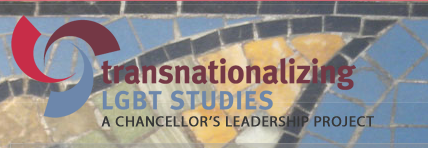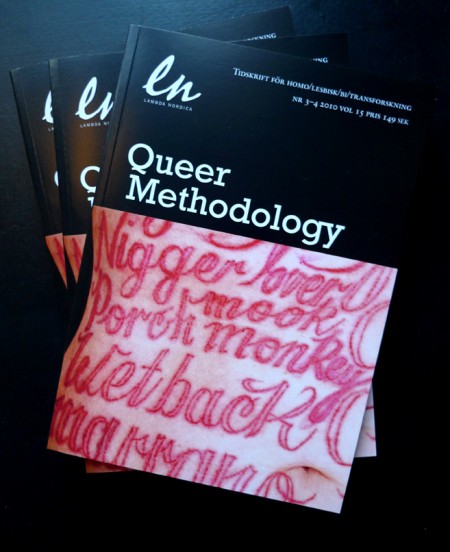
Trikster has received this interesting Call for Papers about a conference in Madrid next year. The CfP is in English, Spanish, and French, and note: The deadline for abstracts has been extended to January 5, 2011.
LGBT/Queer Studies:
Toward Trans/national Scholarly and Activist Kinships
An International Conference
Madrid, Spain
July 3, 4, and 5, 2011
Keynote speakers:
– Zackie Achmat (Director, Centre for Law & Social Justice, Cape Town, South Africa)
– Sunil Gupta (Photographer, writer and curator, Delhi/London)
– Jin Haritaworn (Fellow, Helsinki Collegium for Advanced Studies, Finland)
– Beatriz Preciado (Professor, Université de Paris VIII, France)
(biographical information available on the website)
Note: Gay Pride is July 2 in Madrid
Organized by the LGBT Studies Program & Minor
Chancellor’s Leadership Project
Syracuse University
Syracuse, NY, USA
We invite scholars and activists to join in an exploration of the methods, possibilities, challenges, and dangers of doing LGBT/queer scholarship, activism, pedagogy, and curriculum in a transnationalized and technologically mediated world. We want to address the many challenges of understanding and responding to the complexly lived lives of queer subjects, as they are shaped by local and global upheavals and opportunities. What does the ‘transnational’ mean? How are queer lives rendered visible and legible and affectively accessible? What matrices of power make some queer figures more visible than others? What new forms of scholarship and activism emerge as people, images, ideas, and capital move in rapid, uneven, and complex ways across national borders? How might practices of kinships, however tense or contingent, happen? How does, or should, the transnational turn shape our pedagogies and curricula? And how do we connect and collaborate as scholars and activists across the globe? These are messy knowledges, nuanced knowledges, framed by the local and the global in complicated and often surprising ways.
We are interested in a truly global conversation, and encourage submissions about and from all over the world. We hope too to produce some form of publication out of the conference.
Possible topics:
Representing the complexities of everyday queer lives
Working with queer archives and memory
Analyzing gay imperialism
Designing pedagogies and curricula
Sustaining scholarly relationships across borders
Engaging with queer suffering and activism across borders
Studying legal and political responses to queer suffering
Queer media and literature
Exploring queer diasporas and homonationalisms
Writing queer histories
Analyzing queer labor and immigration
Responding to the challenges of translation and access
We invite scholars and activists to submit paper proposals (no more than 500 words) or complete panels (of no more than three papers) that address questions like these from various perspectives. English is the primary language of the conference, and we will accept submissions in Spanish and French. Please submit paper proposals or panel proposals electronically here.
Please feel free to contact Margaret Himley (mrhimley@syr.edu) or Andrew London (anlondon@maxwell.syr.edu), co-directors of the LGBT Studies Program and Minor at Syracuse University, for more information or with thoughts or questions about this conference/workshop. Read more here.
+++
Convocatoria: fecha límite 5 de enero, 2011.
LGBT/Estudios ‘Queer
Hacia afinidades trans/nacionales de investigación y activismo
Un congreso internacional
Madrid, España
3, 4, 5 de julio 2.011
Keynotes speakers:
– Zackie Achmat (Director, Centre for Law & Social Justice, Cape Town, South Africa)
– Sunil Gupta (Photographer, writer and curator, Delhi/London)
– Jin Haritaworn (Fellow, Helsinki Collegium for Advanced Studies, Finland)
– Beatriz Preciado (Professor, Université de Paris VIII, France)
Ojo: Orgullo Gai en España el 2 de julio en Madrid
Comité organizador: LGBT Studies Program & Minor
Chancellor¹s Leadership Project
Syracuse University
Syracuse, NY, USA
Invitamos a los académicos y activistas participar en la exploración de los métodos, posibilidades, desafíos y peligros de desarrollar el campo de investigación, el activismo, la pedagogía y el programa de estudios LGBT/queer en un mundo mediado por lo transnacional y la tecnología. Queremos destacar los desafíos múltiples de comprender y responder a las vidas multidimensionales de los sujetos queer, y la influencia de oportunidades y trastornos tanto locales como globales. ¿Qué significa lo transnacional? ¿Cómo se logra hacer visible y legible las vidas queer y cómo se vuelven accesibles? ¿Cuáles son las redes de poder que hacen que algunas figuras queer sean más visibles que otras? ¿Cuáles son nuevas formas de investigación y activismo que emergen cuando gente, imágenes, ideas y bienes cruzan de modo rápido, complejo y sin estabilidad las fronteras nacionales? ¿Cómo se puede lograr conexiones de afinidades, aunque sean tensas o contingentes? ¿Cómo formula o cómo se debe formular, lo transnacional nuestra pedagogía y programa de estudios? Y ¿cómo podemos conectar y colaborar internacionalmente como académicos, investigadores y activistas? Estas ideas son conocimientos desordenados, conocimientos matizados, marcados por lo local y global de maneras complicadas y, a menudo, sorprendentes.
Tenemos interés un una conversación verdaderamente global y animamos a todos proponer ponencias que representen todas partes del mundo. Esperamos también publicar las actas del congreso.
Temas posibles:
Representar la complejidad de las vidas cotidianas queer
Trabajar con el archivo y memoria queer
Analizar el imperialismo gai
El diseño de la pedagogía y los programas de curso
Sostener las relaciones académicas internacionales
Dedicarse al sufrimiento queer y el activismo multinacional
Estudiar decisiones y respuestas legales y políticos al sufrimiento queer
Literatura y prensa queer
Explorar la diáspora queer y lo homonacional.
Escribir la historia queer
Analizar el trabajo y la inmigración queer
Responder a los desafíos de la traducción y el acceso a la información
Invitamos a los académicos y los activistas proponer ponencias (máximo 500 palabras) o sesiones (máximo tres ponencias) que se indagan en estas preguntas de varias perspectivas. El Inglés será el idioma principal del congreso pero aceptaremos propuestas en Español y en Francés. Favor de entrgar las propuestas para una ponencia o una sesión eletrónicamente.
No duden en contactar a Margaret Himley (mrhimley@syr.edu) o a Andrew London (anlondon@maxwell.syr.edu), co-directores del Programa de LGBT Studies and Minor en Syracuse University, para más información o con ideas o preguntas sobre el congreso/taller.
+++
Appel à communications
Date limite: le 5 janvier 2011
Les études ‘LGBT/Queer’
Le ‘Trans/national’: vers des affinités activistes et intellectuelles
Un colloque international
Madrid (Espagne)
le 3,4, et 5 juillet, 2010
Keynote speakers:
– Zackie Achmat (Director, Centre for Law & Social Justice, Cape Town, South Africa)
– Sunil Gupta (Photographer, writer and curator, Delhi/London)
– Jin Haritaworn (Fellow, Helsinki Collegium for Advanced Studies, Finland)
– Beatriz Preciado (Professor, Université de Paris VIII, France)
Nous invitons chercheurs et activistes à participer à l’exploration des méthodes, des possibilités, des défis, et des dangers de la recherche, de l’activisme, de la pédagogie, et du curriculum ‘LGBT/Queer’ dans un contexte transnational dont la technologie sert de médiateur. Nous aborderons les défis qu’entraînent les tentatives de comprendre et répondre à la complexité de l’expérience vécue du sujet ‘queer’ à la fois bouleversé et favorisé par son mileu actuel, sur le plan global ou local. Quelle(s) signification(s) peut-on accorder au ‘transnational’? Comment la vie ‘queer’ atteint-elle la visibilité, la lisibilité, et l’accessibilité? Quelles matrices de pouvoir rendent certaines figures ‘queer’ plus visibles que d’autres? Quelles nouvelles formes de recherches et d’activisme se manifestent lorsque les gens, les images, les idées, et l’argent franchissent les frontières nationales de façon rapide, inégale, et complèxe? Comment de nouvelles pratiques de parenté, si tendues ou conditionnelles qu’elles soient, naîtront-elles? Comment le tournant ‘transnational’ influence-t-il la pédagogie et le curriculum? Ce sont des saviors à la fois embrouillés et nuancés, que le global et le local encadrent de manières complèxes et souvent surprenantes.
Nous nous intéressons à une vraie conversation globale, et invitons des communications qui proviennent du monde entier. Nous espérons éditer un volume de communications prononcées au colloque.
Thèmes proposés:
Représenter la vie quotidienne ‘queer’
L’archive et la mémoire ‘queer’
L’impérialisme gai
Les pédagogies et le curriculum ‘queer’
Encourager les relations scolaires qui franchissent des frontières
L’engagement contre la souffrance / l’activisme trans-frontières
Réponses politiques et légales contre la souffrance ‘queer’
Les médias et la littérature ‘queer’
Le diaspora ‘queer’ et les homo-nationalismes
Ecrire l’histoire ‘queer’
Le travail et l’immigration ‘queer’
La traduction et l’accès: défis et réponses
Nous invitons chercheurs et activistes de proposer (en 500 mots) une communication individuelle, ou bien une session complète de trois
communications de perspectives variées sur une question. L’anglais sera la langue principale du colloque, mais nous accepterons des propositions en français et en espagnol aussi. Veuillez proposer votre communication ou
votre session en ligne.
Les co-directeurs du programme d’études LGBT de Syracuse University voudront bien répondre à vos questions au sujet de ce colloque. Veuillez contacter Margaret Himely (mrhimley@syr.edu) ou Andrew London (anlondon@maxwell.syr.edu).

